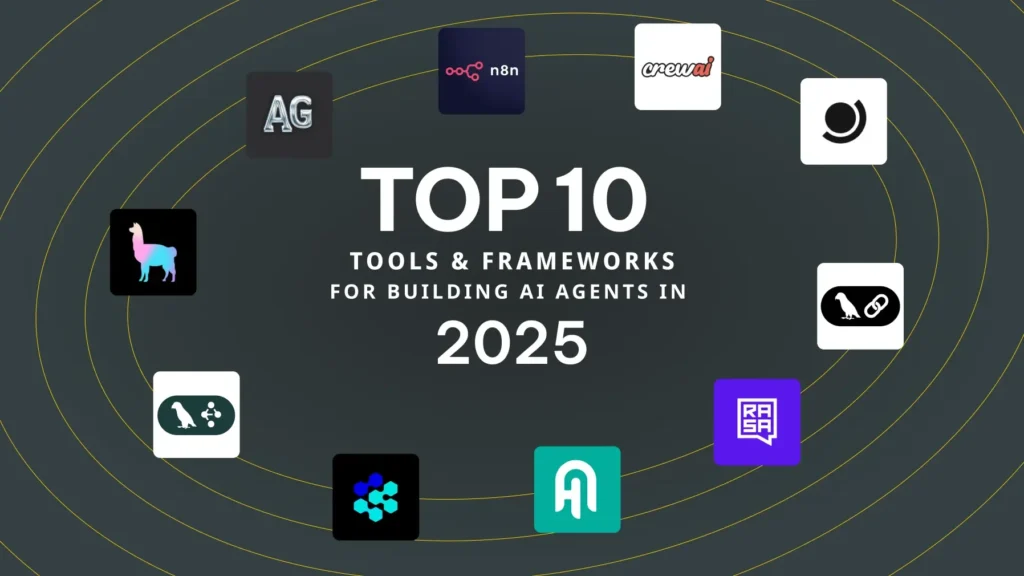Table of Contents
- Introduction
- What Are AI Agents?
- Why AI Agents Are Important in 2025
- Key Trends in AI Agents (2025)
- Top AI Agent Tools for 2025
- Microsoft Copilot Studio
- IBM Watsonx Assistant
- CrewAI
- AutoGPT
- Manus AI
- Google ADK (Agent Development Kit)
- Devin AI
- Intercom Fin AI Agent
- eesel AI
- 11x AI Sales Agent
- Detailed Comparison Table
- Use Cases: Which Tool Is Best for What?
- Challenges & Risks of Using AI Agents
- How to Choose the Right AI Agent Tool
- Conclusion
- FAQs
1. Introduction
Artificial Intelligence has entered a new era where automation and intelligent decision-making are no longer optional but essential. Among the many advancements, AI Agents stand out as the most impactful technology for 2025. They help businesses, professionals, and individuals automate repetitive tasks, improve productivity, and make smarter decisions.
In this blog, we’ll explore the top AI Agents tools for 2025, their unique features, pros/cons, and how you can select the best one for your needs.
2. What Are AI Agents?
AI Agents are AI-powered systems that can autonomously or semi-autonomously perform tasks based on a given goal. Unlike basic chatbots, they:
- Understand complex goals and break them into smaller tasks.
- Maintain context and memory.
- Integrate with external tools, APIs, and platforms.
- Can work in multi-step workflows with minimal human input.
Example: Instead of just answering questions, an AI Agent can research a topic, prepare a report, send it by email, and update a task management system.
3. Why AI Agents Are Important in 2025
AI Agents are changing how we work and live. Here’s why they’re critical:
- Time-saving: Automate repetitive and manual tasks.
- Error reduction: More consistent and reliable than manual effort.
- Scalability: One agent can handle thousands of tasks simultaneously.
- Better decision-making: Provide actionable insights from data.
4. Key Trends in AI Agents (2025)
| Trend | Description |
|---|---|
| Multi-Agent Systems | Teams of AI agents collaborating like humans with role-based responsibilities. |
| No-Code/Low-Code Platforms | Non-technical users can create and customize agents visually. |
| Enterprise-Grade Security | Compliance with HIPAA, GDPR, and corporate data protection standards. |
| RAG (Retrieval-Augmented Generation) | Agents pulling knowledge from live databases and the internet. |
| Memory & Personalization | Context-aware agents that remember user preferences and history. |
5. Top AI Agent Tools for 2025
5.1 Microsoft Copilot Studio
- Features: Works seamlessly with Microsoft 365, Teams, Outlook, and SharePoint. Enterprise security and workflow automation.
- Pros: Deep Microsoft ecosystem integration, low-code customization.
- Cons: Complex setup, higher cost for small businesses.
- Best For: Enterprises using Microsoft tools.
5.2 IBM Watsonx Assistant
- Features: Advanced NLP, enterprise-grade compliance, healthcare/finance integrations.
- Pros: Secure and reliable for regulated industries.
- Cons: Expensive, requires training.
- Best For: Large organizations in healthcare and finance.
5.3 CrewAI
- Features: Multi-agent framework for collaborative workflows.
- Pros: Open-source flexibility, powerful for developers.
- Cons: Requires technical expertise.
- Best For: Tech startups and developer teams.
5.4 AutoGPT
- Features: Autonomous task execution, web browsing, multi-step task handling.
- Pros: Easy experimentation, great for prototyping.
- Cons: Sometimes unreliable, loops or hallucinations.
- Best For: Researchers and hobbyists.
5.5 Manus AI
- Features: Advanced planning, decision-making, real-world task execution.
- Pros: Promising capabilities, future-oriented.
- Cons: Still maturing, limited ecosystem.
- Best For: Early adopters, researchers.
5.6 Google ADK (Agent Development Kit)
- Features: Built on Gemini and Vertex AI, modular agent development.
- Pros: Strong debugging and integrations with Google Cloud.
- Cons: Learning curve, tied to Google ecosystem.
- Best For: Enterprises using Google Cloud.
5.7 Devin AI
- Features: End-to-end software engineering tasks, bug fixing, debugging.
- Pros: Ideal for developers, saves coding time.
- Cons: Still evolving, not 100% reliable.
- Best For: Software engineers.
5.8 Intercom Fin AI Agent
- Features: Conversational AI for customer support.
- Pros: Great for SaaS and e-commerce customer engagement.
- Cons: Focused mainly on support tasks.
- Best For: Customer support teams.
5.9 eesel AI
- Features: IT service automation, integrates with multiple workflows.
- Pros: Useful for IT operations.
- Cons: Limited customization.
- Best For: IT departments.
5.10 11x AI Sales Agent
- Features: Automates lead generation, follow-ups, and sales tasks.
- Pros: Saves time for sales teams.
- Cons: May generate false positives.
- Best For: Sales-heavy businesses.
6. Detailed Comparison Table
| Tool | Best For | Pros | Cons |
| Microsoft Copilot Studio | Enterprises | Microsoft integration, security | Complex setup, cost |
| IBM Watsonx | Regulated industries | NLP, compliance | Pricey |
| CrewAI | Developers | Open-source, multi-agent | Technical skills needed |
| AutoGPT | Experimenters | Easy, autonomous | Unreliable loops |
| Manus AI | Researchers | Advanced planning | Immature ecosystem |
| Google ADK | Cloud enterprises | Google integration | Limited flexibility |
| Devin AI | Developers | Software automation | Evolving reliability |
| Intercom Fin | Customer support | Conversational AI | Limited focus |
| eesel AI | IT teams | IT workflow automation | Limited customization |
| 11x | Sales teams | Outreach automation | Accuracy issues |
7. Use Cases: Which Tool Is Best for What?
- Customer Support: Watsonx, Intercom.
- Development & Coding: Devin AI, CrewAI, AutoGPT.
- Enterprise Workflow: Microsoft Copilot, Google ADK.
- Sales Outreach: 11x.
- Research & Knowledge Work: AutoGPT, CrewAI, Manus AI.
8. Challenges & Risks of Using AI Agents
- Data Security: Sensitive data risks.
- Hallucinations: Wrong or fabricated results.
- High Costs: Cloud usage and subscriptions.
- Complex Setup: Need technical expertise.
- Over-Reliance: Risk of over-automation.
9. How to Choose the Right AI Agent Tool
- Define your use case.
- Check integration with your existing tools.
- Consider budget and scalability.
- Evaluate security and compliance needs.
- Test with a pilot project before full adoption.
10. Conclusion
2025 is the year where AI Agents are moving from hype to reality. Whether you’re a developer, a sales manager, or a business leader, there’s an AI Agent tool that fits your needs. Start small, experiment, and gradually scale your use of AI agents to maximize efficiency and innovation.
11. FAQs
Q1: Are AI Agents replacing humans?
A: No. They complement humans by automating repetitive tasks while humans handle creative and strategic work.
Q2: Which AI Agent is best for small businesses?
A: AutoGPT and Intercom are affordable and easy for SMBs.
Q3: Do AI Agents require coding knowledge?
A: Some tools are no-code/low-code (like Copilot Studio), while others (CrewAI) need technical expertise.
Q4: Can AI Agents work offline?
A: Most rely on cloud infrastructure, so internet connectivity is usually required.
Q5: How fast will AI Agents grow?
A: Analysts expect the AI agent market to grow exponentially through 2030, especially in enterprise adoption.



Pingback: Smart Ways to Earn and Build Financial Stability in the USA - Epic Globe Services